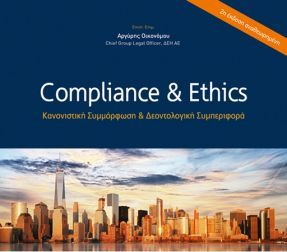We are proud to announce that Penny Kontogeorgou, Managing Partner of ZK Law, has once again been featured in The Legal 500’s Country Comparative Guides. For the third consecutive year, Penny has provided an in-depth analysis of the legal framework surrounding Blockchain, DLT Technologies, and Smart Contracts in Greece.
 Her contribution highlights the evolving regulatory landscape, opportunities, and challenges for blockchain-based businesses and projects operating in Greece. This exclusive insight reflects ZK Law’s dedication to staying at the forefront of technological and legal advancements, empowering businesses to navigate this complex yet transformative sector.
Her contribution highlights the evolving regulatory landscape, opportunities, and challenges for blockchain-based businesses and projects operating in Greece. This exclusive insight reflects ZK Law’s dedication to staying at the forefront of technological and legal advancements, empowering businesses to navigate this complex yet transformative sector.
Key topics covered include:
- Current legislation governing blockchain and digital assets in Greece.
- Compliance challenges for smart contracts and decentralized technologies.
- Insights into Greece’s stance on innovation in the blockchain and crypto ecosystems.
We are honored that Penny continues to represent Greece in this globally renowned guide, solidifying ZK Law’s expertise in Blockchain, Digital Transformation, and Emerging Technologies.
In her analysis, Penny gives answers to the following questions:
-
Please provide a high-level overview of the blockchain market in your jurisdiction. In what business or public sectors are you seeing blockchain or other distributed ledger technologies being adopted?
-
Please outline the principal legislation and the regulators most relevant to the use of blockchain technologies in your jurisdiction. In particular, is there any blockchain-specific legislation or are there any blockchain-specific regulatory frameworks in your jurisdiction, either now or envisaged in the short or mid-term?
-
What is the current attitude of the government and of regulators to the use of blockchain technology in your jurisdiction?
-
Is there a central bank digital currency (‘CBDC’) project in your jurisdiction? If so, what is the status of the project?
-
What is the current approach in your jurisdiction to the treatment of cryptoassets and decentralised finance (‘DeFi’) for the purposes of financial regulation?
-
What is the current approach in your jurisdiction to the treatment of cryptoassets and DeFi for the purposes of anti-money laundering and sanctions?
-
What is the current approach in your jurisdiction to the treatment of cryptoassets and DeFi for the purposes of taxation?
-
Are there any prohibitions on the use or trading of cryptoassets in your jurisdiction? If permitted, is cryptoasset trading common?
-
To what extent have initial coin offerings (‘ICOs’) taken place in your jurisdiction and what has been the attitude of relevant authorities to ICOs? If permissible, what are the key requirements that an entity would need to comply with when launching an ICO?
-
Are there any legal or regulatory issues concerning the transfer of title to or the granting of security over cryptoassets?
-
How are smart contracts characterised within your legal framework? Are there any enforceability issues specific to the operation of smart contracts which do not arise in the case of traditional legal contracts?
-
How are Decentralised Autonomous Organisations (‘DAOs’) treated in your jurisdiction?
-
Have there been any governmental or regulatory enforcement actions concerning blockchain in your jurisdiction?
-
Are there any other generally-applicable laws, case law or regulations that may present issues for the use of blockchain technology (such as privacy and data protection law or insolvency law)?
-
Are there any other key issues concerning blockchain technology in your jurisdiction that legal practitioners should be aware of?
To read the full chapter, visit The Legal 500: Blockchain & DLT in Greece





